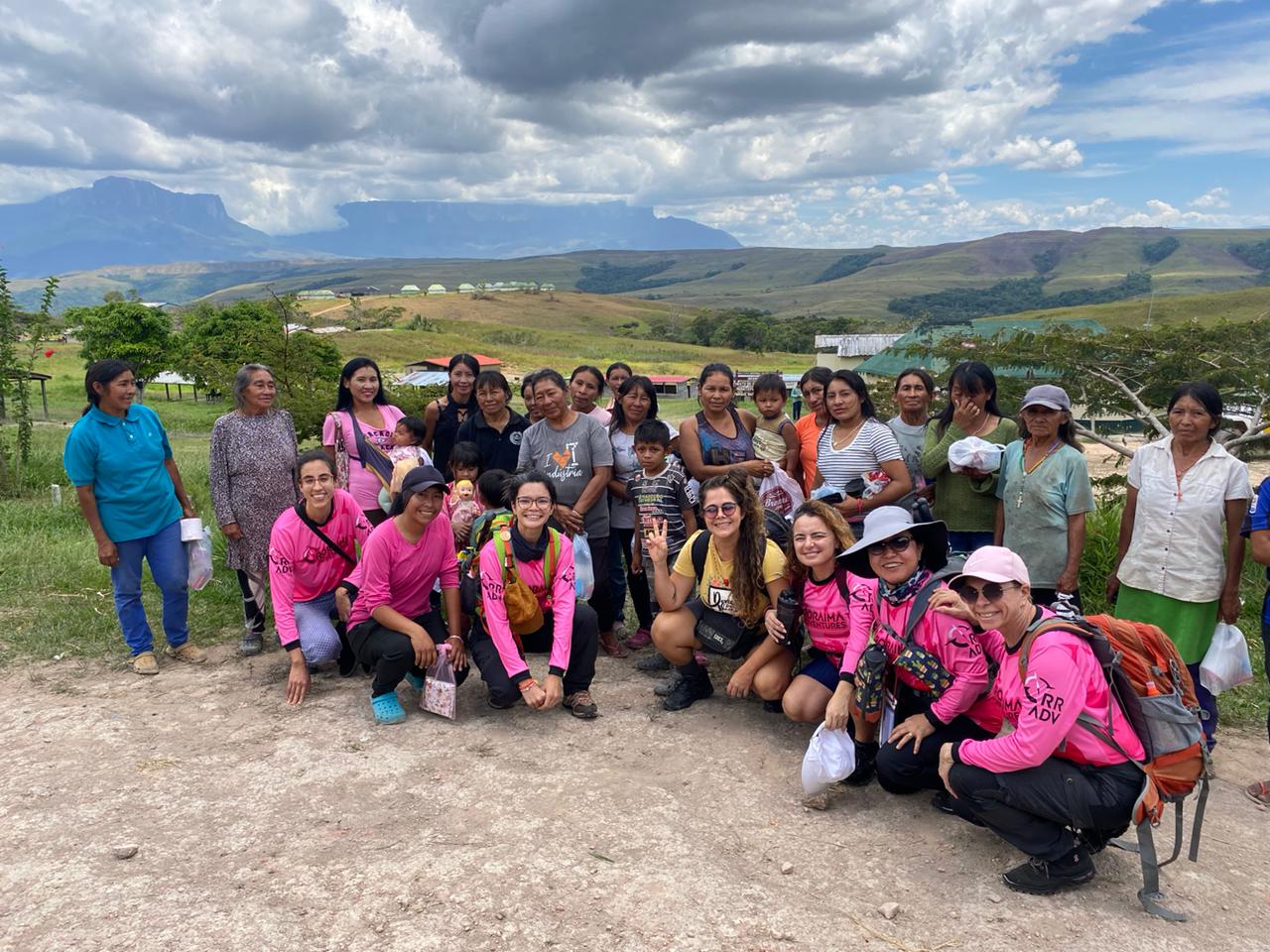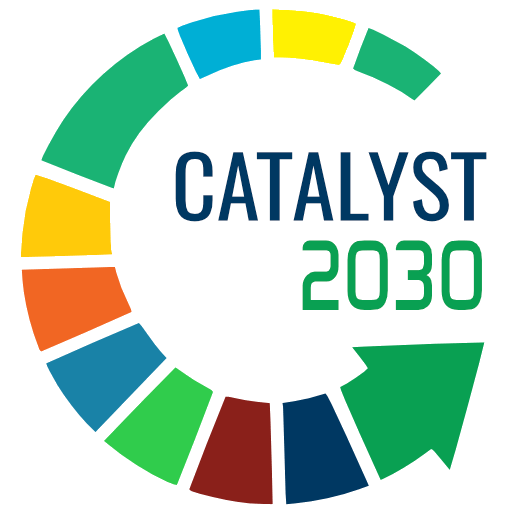
2023 was the first time Dona do Meu Fluxo (Owner of my Flow) crossed borders and was present on Venezuelan soil. Over the year, 1,300 women were empowered. In October, we held an international workshop in the Paraitepuy Community in Venezuela. The Indigenous group visited lives at the base of Mount Roraima and works in nature tourism.
“The women were quite shy at first, but several became interested in the collector. Of those who went up with us afterward to do the Mount Roraima route, one of them had already started using the collector, which was Flor, one of the organizers and the daughter of a community leader. So it was a very interesting and positive experience”, says Tauana Costa, a specialist in social projects here at Raízes. It was Tau who gave the workshop in Spanish and led a round table discussion with the women of the community.
Although we have already established information exchange partnerships with projects in Cape Verde, Africa, this was the first time we had donated Brazil. And last year had other milestones that we’ll talk about below.
Menstrual dignity, sustainability, and female empowerment
We ended the year with more than 1,300 women empowered in 27 workshops. The non-profit project, which turns seven this year, is a partnership between Korui Ciclos de Vida and Raízes Desenvolvimento Sustentável, created in 2017 by these two B-companies founded by women.
Owner of My Flow aims to bring menstrual dignity, sustainability, and female empowerment to many women in vulnerable situations. A pioneer in the fight against menstrual poverty, the project donates menstrual cups through workshops in which, as well as presenting the cup, topics related to the female body, aesthetic standards, self-esteem, sorority, and women’s support networks are also addressed.
Last year was full of achievements. We held workshops in eight Brazilian states: Paraná, São Paulo, Minas Gerais, Rio de Janeiro, Bahia, Maranhão, Amapá and Pará, as well as the Federal District.
Empowered women strengthening our network
2023 also brought us the support of 16 volunteers, making a total of 26 volunteers over the years, a top team, as well as various partnerships; such as Bela Gil, Natura, Voo, Pinheiro Neto Advogados, Paraná Banco, Casadorio, Route Brasil, among others, who have enabled us to conclude seven years of the project with 5,800 women benefiting from the donation of menstrual cups and workshops.
Establishing this solid network of volunteers, empowered women, with some of them repeating expeditions, organizing and leading workshops on their own, has shown us how beautiful and important our work is. We all learned a lot from each other, and seeing the growth and passion of the volunteers was an exciting highlight of the year.
We also entered into a partnership with the Association for the Protection and Assistance of Convicts (APAC) for hybrid workshops with women in the prison system in eight units. We broadcast the workshop remotely and the women met in person in the study/event rooms in Frutal, Viana, Itaúna, Governador Valadares, Conselheiro Lafaiete, São João Del Rey, Rio Piracicaba, and Pouso Alegre.
New partnerships and recognition
Dona do Meu Fluxo’s work didn’t stop there! We also held several important workshops throughout the year, including a large community event with 200 participants in partnership with Associação de Mulheres Agroextrativistas do Médio Juruá, Amazônia (ASMAMJ). Some workshops were also held with educators from Centro Popular de Cultura de Desenvolvimento (CPCD) in São Paulo and Belo Horizonte, a partner of Raízes in projects for territorial transformation through education. We also partnered with PMRA to hold a workshop in Morro das Pedras, BH.
In May, the project took part in the Manifesto for Menstrual Dignity created by Dona do Meu Fluxo in partnership with the Rebbú Institute, Projeto Mãe da Lua, Projeto Menstrua, Segue o Fluxo – Ciclos and the Cine por Elas project.
In the media, Tauana wrote an article for UOL about why it’s essential to fight for menstrual dignity today. You can read the full text by clicking here. And an article in the Pará daily told us a little about the project, its importance, and the action taken to combat menstrual poverty. The initiative was organized by Belém City Hall, through the Belém Women’s Coordination Office (Combel) and the Municipal Health Department (Sesma).
Brazilian advances in menstrual dignity
According to the United Nations Children’s Fund (UNICEF), menstrual dignity refers to ensuring that people who menstruate have access to adequate hygienic conditions, affordable menstrual products, and an environment that respects and preserves their dignity during the menstrual period. The term highlights the importance of addressing the specific needs related to menstruation, promoting gender equality, menstrual health, and respect for human rights.
In Brazil, there is still a lot to be done for menstrual poverty, but some public policy projects have begun to emerge in an attempt to change this scenario.
The Federal Government has signed a decree establishing the Program for the Protection and Promotion of Menstrual Dignity. Approximately eight million individuals will be covered by this initiative, which has an annual investment of R$418 million. The distribution of disposable pads will be carried out by the Unified Health System (SUS) and led by the Ministry of Health. In addition, drugstores registered with the Popular Pharmacy Program have already started distributing them free of charge.
According to the gov.br website, the new policy is aimed at the most vulnerable people, based on the Bolsa Família and Cadastro Único criteria. It covers low-income students enrolled in public schools, people living on the streets or in conditions of extreme social vulnerability, people deprived of their liberty, and those subject to socio-educational measures.
Owning your own flow is a long way off
Recent advances show that the major problem of menstrual dignity in Brazil is, fortunately, beginning to be addressed. We know that in addition to distributing pads, women need to have information about their own bodies, their reproductive cycle, and the best ways to take care of their physical and mental health.
Beyond pads, public policies to empower women still need to make progress on sanitation, education, and health issues more broadly. Not to mention the environmental issue, one of the important reasons for adhering to the “cup”. Around here we continue with the Own My Flow project, empowering through workshops on women’s cycles and donations of collectors and reflecting on the other female flows that still need and can be more empowered.
Transitioning from 2023 to 2024
Whew! So many things, right? As you can see, the year 2023 was full of achievements for Dona do Meu Fluxo and for the menstrual dignity agenda that we embrace so much. But in order to continue not only the fight against menstrual poverty but also the empowerment of the most vulnerable women in a broad way in 2024, we need support.
If your organization identifies with the cause and would like to contribute to DMF in a new year with great innovations, please contact us at [email protected].

